|
The uncertainty engendered by the Federal Reserve's September 17th decision and ensuing FedSpeak sent equities on a tailspin. The downward move was exacerbated by bleak manufacturing data from China and sent most equity indexes lower on the week. Investors were somewhat mollified by Fed Chair Janet Yellen's Thursday night speech where she laid out her most detailed argument yet for the central bank to begin raising short term interest rates in the coming months, saying that inflation pressures will build gradually over the next few years. A stronger than anticipated final revision to U.S. second quarter growth bolstered the idea of a Fed funds rate increase. The prospect of higher rates threatens to draw capital to the U.S. from emerging markets as investors search for yield.
Some investors and analysts interpreted the FOMC's decision last week to keep near zero rates unchanged as a signal it believed global economies were not yet strong enough to withstand a rate increase. And the uncertainty about the timing continues to cause swings in global markets. Years of low interest rates since the global financial crisis fueled stock rallies globally.
According to the Asian Development Bank's Asian Development Outlook 2015 Update, China's declining appetite for energy, metals and other commodities will hurt commodity focused export economies including Mongolia, Indonesia, Azerbaijan, and Kazakhstan. For the second time in just over two months, the ADB cut China's economic growth forecasts — to 6.8 percent in 2015 and 6.7 percent in 2016. In July, it estimated a 7 percent expansion for this year and 6.8 percent for next. China is set to grow at its slowest pace in a quarter century this year even after five rate cuts and fiscal stimulus. Its slowdown is rippling across the region with the ADB cutting growth forecasts for developing Asian economies for this year and next. For example, Mongolia, which exports copper, will suffer an estimated 2.7 percentage point decline in gross domestic product growth for every 0.2 percentage point drop in China's expansion.
| |
|
2014 |
2015 |
% Change |
|
Index |
Dec 31 |
Sep 18 |
Sep 25 |
Week |
2015 |
| Asia/Pacific |
|
|
|
|
|
| Australia |
All Ordinaries |
5388.6 |
5194.3 |
5076.7 |
-2.3% |
-5.8% |
| Japan |
Nikkei 225 |
17450.8 |
18070.2 |
17880.5 |
-1.0% |
2.5% |
| Hong Kong |
Hang Seng |
23605.0 |
21920.8 |
21186.3 |
-3.4% |
-10.2% |
| S. Korea |
Kospi |
1915.6 |
1996.0 |
1942.9 |
-2.7% |
1.4% |
| Singapore |
STI |
3365.2 |
2879.6 |
2832.6 |
-1.6% |
-15.8% |
| China |
Shanghai Composite |
3234.7 |
3097.9 |
3092.4 |
-0.2% |
-4.4% |
|
|
|
|
|
|
|
| India |
Sensex 30 |
27499.4 |
26218.9 |
25863.5 |
-1.4% |
-5.9% |
| Indonesia |
Jakarta Composite |
5227.0 |
4380.3 |
4209.4 |
-3.9% |
-19.5% |
| Malaysia |
KLCI |
1761.3 |
1669.5 |
1615.0 |
-3.3% |
-8.3% |
| Philippines |
PSEi |
7230.6 |
7131.9 |
6917.55 |
-3.0% |
-4.3% |
| Taiwan |
Taiex |
9307.3 |
8462.1 |
8132.4 |
-3.9% |
-12.6% |
| Thailand |
SET |
1497.7 |
1390.3 |
1376.8 |
-1.0% |
-8.1% |
|
|
|
|
|
|
|
| Europe |
|
|
|
|
|
|
| UK |
FTSE 100 |
6566.1 |
6104.1 |
6109.0 |
0.1% |
-7.0% |
| France |
CAC |
4272.8 |
4535.9 |
4480.7 |
-1.2% |
4.9% |
| Germany |
XETRA DAX |
9805.6 |
9916.2 |
9688.5 |
-2.3% |
-1.2% |
| Italy |
FTSE MIB |
19012.0 |
21514.9 |
21339.1 |
-0.8% |
12.2% |
| Spain |
IBEX 35 |
10279.5 |
9847.2 |
9519.5 |
-3.3% |
-7.4% |
| Sweden |
OMX Stockholm 30 |
1464.6 |
1453.1 |
1418.5 |
-2.4% |
-3.1% |
| Switzerland |
SMI |
8983.4 |
8739.2 |
8505.9 |
-2.7% |
-5.3% |
|
|
|
|
|
|
|
| North America |
|
|
|
|
|
| United States |
Dow |
17823.1 |
16384.8 |
16314.7 |
-0.4% |
-8.5% |
|
NASDAQ |
4736.1 |
4827.2 |
4686.5 |
-2.9% |
-1.0% |
|
S&P 500 |
2058.9 |
1958.1 |
1931.3 |
-1.4% |
-6.2% |
| Canada |
S&P/TSX Comp. |
14632.4 |
13646.9 |
13378.6 |
-2.0% |
-8.6% |
| Mexico |
Bolsa |
43145.7 |
43565.1 |
42435.2 |
-2.6% |
-1.6% |
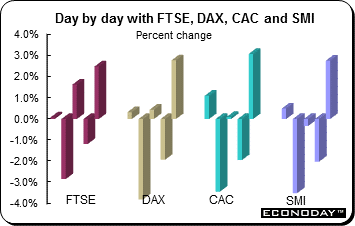 Equities ended an otherwise volatile week solidly in positive territory. However for the week, only the FTSE managed to eke out gain, and only 0.1 percent. All others retreated. The CAC was down 1.2 percent, the DAX lost 2.3 percent and the SMI was 2.7 percent lower. Equities ended an otherwise volatile week solidly in positive territory. However for the week, only the FTSE managed to eke out gain, and only 0.1 percent. All others retreated. The CAC was down 1.2 percent, the DAX lost 2.3 percent and the SMI was 2.7 percent lower.
Investors were heartened by Janet Yellen's comments late Thursday, which provided the clarity investors had been seeking on the direction of U.S. monetary policy. Earlier in the week, shares were dragged lower in the fallout from the Volkswagen diesel emission scandal that has continued to pressure the rest of the European automakers. Stocks with exposure to China were also hard hit by continued concerns over the slowdown in China's economy. It was a relatively quiet week for economic data. Germany's Ifo survey inched up. However this was offset by the easing in the September flash PMIs.
Norge Bank lowers rates again
 The Norge Bank, Norway's central bank, reduced its main interest rate on Thursday for the second time in four months, sending its currency tumbling. The bank said it might lower rates more than previously anticipated in the coming year as growth prospects have weakened. Oil and natural gas companies, which generate a fifth of the Nordic economy's output, have been canceling investments and laying off thousands of workers, preparing for an extended period of low crude oil prices. The Norge Bank, Norway's central bank, reduced its main interest rate on Thursday for the second time in four months, sending its currency tumbling. The bank said it might lower rates more than previously anticipated in the coming year as growth prospects have weakened. Oil and natural gas companies, which generate a fifth of the Nordic economy's output, have been canceling investments and laying off thousands of workers, preparing for an extended period of low crude oil prices.
Norge Bank governor Oeystein Olsen said, "The current outlook for the Norwegian economy suggests that the key policy rate may be reduced further in the coming year. ... It is a new era for the Norwegian economy. We are no longer in a league of our own." He added that the bank did not discuss keeping rates at the same level. The Norwegian krone tumbled against the euro after markets were surprised by the move.
The central bank said growth in the economy was likely to remain low for a longer period than projected earlier, thanks to the drop in oil prices through the summer. The bank has been performing a balancing act, however, as household debt in the country remains high and lower interest rates will not help tackle that problem.
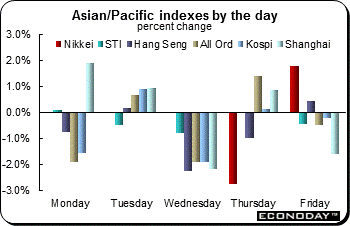 Equities retreated across the board last week. Now only two indexes — the Nikkei and Kospi — are positive in 2015. The few economic events — the flash manufacturing PMIs for September for China and Japan — were disappointing. Most sagged Friday on comments by U.S. Federal Reserve Chair Janet Yellen on the U.S. economic outlook, inflation and prospects of an interest rate increase at some point this year kept investors' risk appetite in check heading into the weekend. Japanese shares finished sharply higher after Prime Minister Shinzo Abe set out three new goals for "Abenomics" targeting a 20 percent increase in gross domestic product to ¥600 trillion. Equities retreated across the board last week. Now only two indexes — the Nikkei and Kospi — are positive in 2015. The few economic events — the flash manufacturing PMIs for September for China and Japan — were disappointing. Most sagged Friday on comments by U.S. Federal Reserve Chair Janet Yellen on the U.S. economic outlook, inflation and prospects of an interest rate increase at some point this year kept investors' risk appetite in check heading into the weekend. Japanese shares finished sharply higher after Prime Minister Shinzo Abe set out three new goals for "Abenomics" targeting a 20 percent increase in gross domestic product to ¥600 trillion.
The Shanghai Composite slipped 0.2 percent on the week while the Hang Seng lost 3.4 percent. The former lost 1.6 percent Friday as investors fretted over valuations amid weakening economic growth. On Monday, the Chinese Beige Book showed that the service sector in China firmed up in the third quarter but not manufacturing which put in its most sluggish performance in two years during the July to September quarter. And while China exports were weaker, they were a less significant driver of overall growth according to CCB International. The results are based on a survey of more than 2,100 businesses.
Japanese markets were open only on Thursday and Friday. The Nikkei dropped 2.8 percent Thursday only to rebound 1.8 percent Friday for a loss of 1.0 percent on the week. Stocks advanced even though the latest consumer price index indicated that the country had retreated back into deflationary territory in August, thanks to swooning oil prices. The figure is likely to convince more analysts that the Bank of Japan must ramp up its monetary easing program once more otherwise investors may doubt the bank's ability to achieve 2 percent inflation by next year as planned.
Friday's gain occurred after a pledge by Japanese Prime Minister Shinzo Abe to strengthen the country's economy. The gains came after Mr Abe announced an ambitious goal to expand the nation's economy by around a fifth, though he didn't say exactly how or when that growth would be achieved. The announcement, at a news conference where Mr. Abe was officially appointed to another three year term as party leader, comes as Japan's economy is sputtering, fueling questions about the success of his Abenomics growth program. Mr Abe said he would aim to increase the size of Japan's economy to ¥600 trillion ($5 trillion), from around ¥490 trillion in the latest fiscal year.
Given how much the BoJ has already done, Governor Haruhiko Kuroda is reluctant to add another log to the fire. He has consistently taken an upbeat stance this year, arguing that dwindling inflation reflects global commodity prices and a weak recovery — temporary factors that say little about the underlying, domestic trend.
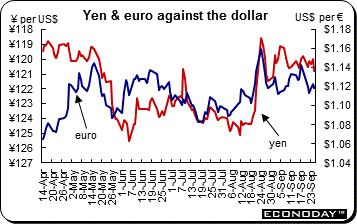 The U.S. dollar was up against all of its major counterparts including the euro, yen, pound, Swiss franc and the Canadian and Australian dollars after U.S. Federal Reserve Chair Janet Yellen left the door open to an increase in interest rates before year's end. The remarks put the currency on track for its best week in over two months. The dollar had fallen to a three week low against a basket of major currencies after the Fed failed to raise rates at its September meeting and cut its U.S. growth forecasts a week earlier. Some investors pushed their expectations for a first increase into 2016. But in a speech late Thursday, Yellen said she expected the Fed to begin raising rates later in 2015, as long as inflation remained stable and the U.S. economy was strong enough to boost employment. The U.S. dollar was up against all of its major counterparts including the euro, yen, pound, Swiss franc and the Canadian and Australian dollars after U.S. Federal Reserve Chair Janet Yellen left the door open to an increase in interest rates before year's end. The remarks put the currency on track for its best week in over two months. The dollar had fallen to a three week low against a basket of major currencies after the Fed failed to raise rates at its September meeting and cut its U.S. growth forecasts a week earlier. Some investors pushed their expectations for a first increase into 2016. But in a speech late Thursday, Yellen said she expected the Fed to begin raising rates later in 2015, as long as inflation remained stable and the U.S. economy was strong enough to boost employment.
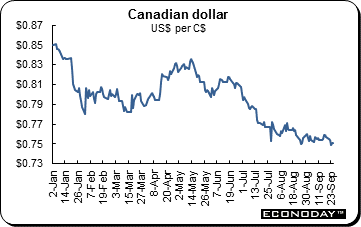 The Canadian dollar (loonie) has slipped to a fresh 11-year low against the U.S. dollar, hot on the heels of a big drop in the Norwegian krone that serves as a reminder of the pressure on commodity currencies. The loonie lost 0.8 percent against the dollar last week. Oil and commodity heavy currencies have come under serious pressure from the relentless decline in oil prices. Canada's economy contracted for the second straight quarter in the three months to June, and Norges Bank's surprising action has intensified fears that there is no end in sight for the woes of developed oil exporters. In July, the Bank of Canada cut its policy interest rate to a record low of 0.5 percent. As the Fed moves towards tightening, the growing divergence between the two countries' policies has intensified the U.S. currency's hammering of the loonie. The Canadian dollar (loonie) has slipped to a fresh 11-year low against the U.S. dollar, hot on the heels of a big drop in the Norwegian krone that serves as a reminder of the pressure on commodity currencies. The loonie lost 0.8 percent against the dollar last week. Oil and commodity heavy currencies have come under serious pressure from the relentless decline in oil prices. Canada's economy contracted for the second straight quarter in the three months to June, and Norges Bank's surprising action has intensified fears that there is no end in sight for the woes of developed oil exporters. In July, the Bank of Canada cut its policy interest rate to a record low of 0.5 percent. As the Fed moves towards tightening, the growing divergence between the two countries' policies has intensified the U.S. currency's hammering of the loonie.
|
|
2014 |
2015 |
% Change |
|
|
Dec 31 |
Sep 18 |
Sep 25 |
Week |
2015 |
| U.S. $ per currency |
|
|
|
|
|
| Australia |
A$ |
0.8170 |
0.7196 |
0.703 |
-2.3% |
-14.0% |
| New Zealand |
NZ$ |
0.7801 |
0.6404 |
0.639 |
-0.3% |
-18.1% |
| Canada |
C$ |
0.8614 |
0.7565 |
0.751 |
-0.8% |
-12.8% |
| Eurozone |
euro (€) |
1.2098 |
1.1303 |
1.120 |
-0.9% |
-7.4% |
| UK |
pound sterling (£) |
1.5585 |
1.5536 |
1.519 |
-2.2% |
-2.5% |
|
|
|
|
|
|
|
| Currency per U.S. $ |
|
|
|
|
|
| China |
yuan |
6.2055 |
6.3643 |
6.375 |
-0.2% |
-2.7% |
| Hong Kong |
HK$* |
7.7546 |
7.75 |
7.750 |
0.0% |
0.1% |
| India |
rupee |
63.0437 |
65.6738 |
66.156 |
-0.7% |
-4.7% |
| Japan |
yen |
119.8200 |
119.89 |
120.580 |
-0.6% |
-0.6% |
| Malaysia |
ringgit |
3.4973 |
4.1965 |
4.386 |
-4.3% |
-20.3% |
| Singapore |
Singapore $ |
1.3246 |
1.4003 |
1.426 |
-1.8% |
-7.1% |
| South Korea |
won |
1090.9800 |
1162.8 |
1194.600 |
-2.7% |
-8.7% |
| Taiwan |
Taiwan $ |
31.6560 |
32.415 |
33.013 |
-1.8% |
-4.1% |
| Thailand |
baht |
32.8800 |
35.66 |
36.162 |
-1.4% |
-9.1% |
| Switzerland |
Swiss franc |
0.9942 |
0.9693 |
0.9799 |
-1.1% |
1.5% |
| *Pegged to U.S. dollar |
|
|
|
|
| Source: Bloomberg |
|
|
|
|
|
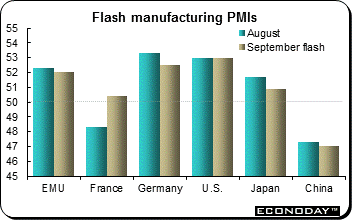 September flash composite output index slipped 0.4 points from its final August level to 53.9, still far enough above the 50 breakeven mark to signal a decent pace of expansion. However, the manufacturing PMI provisionally slipped 0.3 points to 52.0, a 5-month low as output growth eased to a 4-month trough and new orders, despite a continued robust rate of expansion, slipped from August's 16-month high. Sector headcount was up again, albeit by the smallest amount since February, and potentially significantly, backlogs saw their steepest gain since April 2014. However, input costs were down sharply and, ominously, factory gate prices declined for the first time in half a year. September flash composite output index slipped 0.4 points from its final August level to 53.9, still far enough above the 50 breakeven mark to signal a decent pace of expansion. However, the manufacturing PMI provisionally slipped 0.3 points to 52.0, a 5-month low as output growth eased to a 4-month trough and new orders, despite a continued robust rate of expansion, slipped from August's 16-month high. Sector headcount was up again, albeit by the smallest amount since February, and potentially significantly, backlogs saw their steepest gain since April 2014. However, input costs were down sharply and, ominously, factory gate prices declined for the first time in half a year.
The flash services PMI was 0.4 points short of August's final reading at a still solid 54.0. The rise in new business recorded a 5-month peak and growth of backlogs was the fastest since May 2011. Despite this, employment saw its smallest increase in eight months. Input cost inflation was little changed and output prices were finally raised for the first time since August 2011. For the core countries it was the familiar story of a decent performance by Germany (composite output index 54.3) and, despite some improvement, continued underperformance by France (51.4). Still, the rest of the region enjoyed faster growth than both, even if September's rate eased to a 3-month low.
Elsewhere, China's manufacturing PMI continued to deteriorate for a seventh consecutive month. In Japan, manufacturing also eased to 50.9 from 51.7 the month before, but remained above the 50 breakeven level between growth and contraction. The U.S. reading was unchanged from August at 53.0.
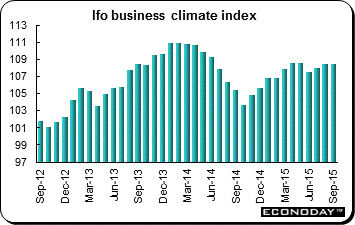 September's Ifo survey pointed to little change in overall business sentiment this month as weaker current conditions were offset by a more bullish assessment of the economic outlook. The headline index edged just 0.2 points higher to 108.5. The measure has been within a tight 106.8 to 108.7 range since the start of the year. However, the relative stability of the overall gauge masked slightly more volatile components. The current conditions sub-index fell 0.8 points to 114.0, its first decline in three months but still slightly above its July posting. Expectations on the other hand rose 1.1 points to 103.3, their highest mark since April although, again, comfortably within the range seen over the year to date. At a sector level morale improved to multi-month highs in retail, construction and wholesale but slipped in manufacturing (lowest since February) and to a lesser extent, in services. September's Ifo survey pointed to little change in overall business sentiment this month as weaker current conditions were offset by a more bullish assessment of the economic outlook. The headline index edged just 0.2 points higher to 108.5. The measure has been within a tight 106.8 to 108.7 range since the start of the year. However, the relative stability of the overall gauge masked slightly more volatile components. The current conditions sub-index fell 0.8 points to 114.0, its first decline in three months but still slightly above its July posting. Expectations on the other hand rose 1.1 points to 103.3, their highest mark since April although, again, comfortably within the range seen over the year to date. At a sector level morale improved to multi-month highs in retail, construction and wholesale but slipped in manufacturing (lowest since February) and to a lesser extent, in services.
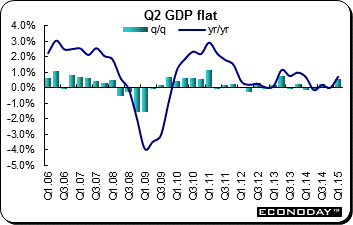 Second quarter final gross domestic product was unchanged on the quarter and up 1.1 percent from the same quarter a year ago. The quarterly rate of household spending was shaded a tick lower to zero but gross fixed capital formation was marginally stronger at minus 0.2 percent with small positive changes to both household and business investment. Government consumption was also 0.1 percentage points stronger at 0.4 percent. As a result, final domestic demand still added just 0.1 percentage points to the quarterly change in total output. The inventory contribution (minus 0.5 percentage points) was revised a little more negative. Quarterly export growth was raised 0.3 percentage points to 2.0 percent while imports were trimmed fractionally to a 0.5 percent rate. This left net exports adding 0.4 percentage points to overall growth, just 0.1 percentage point more than previously reported. Second quarter final gross domestic product was unchanged on the quarter and up 1.1 percent from the same quarter a year ago. The quarterly rate of household spending was shaded a tick lower to zero but gross fixed capital formation was marginally stronger at minus 0.2 percent with small positive changes to both household and business investment. Government consumption was also 0.1 percentage points stronger at 0.4 percent. As a result, final domestic demand still added just 0.1 percentage points to the quarterly change in total output. The inventory contribution (minus 0.5 percentage points) was revised a little more negative. Quarterly export growth was raised 0.3 percentage points to 2.0 percent while imports were trimmed fractionally to a 0.5 percent rate. This left net exports adding 0.4 percentage points to overall growth, just 0.1 percentage point more than previously reported.
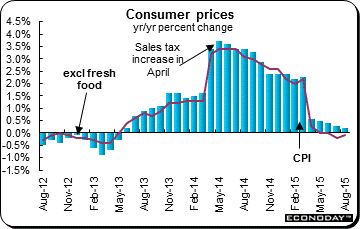 Inflation continues to defy the Bank of Japan. As expected the consumer price index excluding fresh food slipped 0.1 percent on the year and was unchanged on the month. The CPI excluding both fresh food and energy was up 0.3 percent and 0.8 percent on the year. Energy prices continue to weigh on the index, declining 10.5 percent on the year. However, food excluding perishables was up 1.8 percent from a year ago while electronics goods and TV were up 5.4 percent and 8.7 percent respectively. Only last week, Bank of Japan governor Haruhiko Kuroda reiterated that the country remains on track to reach its 2 percent inflation target around the first half of 2016 (it had originally been by April 2015) as the effects of low oil prices fade and the economy continues its moderate recovery. But that target still looks way off, given the most recent data show prices going backward at the core level. Inflation continues to defy the Bank of Japan. As expected the consumer price index excluding fresh food slipped 0.1 percent on the year and was unchanged on the month. The CPI excluding both fresh food and energy was up 0.3 percent and 0.8 percent on the year. Energy prices continue to weigh on the index, declining 10.5 percent on the year. However, food excluding perishables was up 1.8 percent from a year ago while electronics goods and TV were up 5.4 percent and 8.7 percent respectively. Only last week, Bank of Japan governor Haruhiko Kuroda reiterated that the country remains on track to reach its 2 percent inflation target around the first half of 2016 (it had originally been by April 2015) as the effects of low oil prices fade and the economy continues its moderate recovery. But that target still looks way off, given the most recent data show prices going backward at the core level.
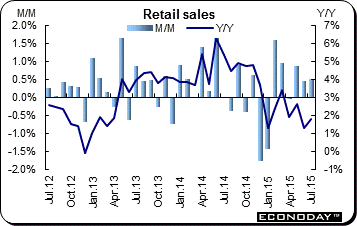 July retail sales extended their recent positive run to three months with a 0.5 percent increase from June (revised down to 0.4 percent). The gain boosted annual sales growth from 1.3 percent to 1.8 percent. The recovery in nominal demand, which reflected increases in six of 11 subsectors, was only partially mirrored in volumes which edged up 0.2 percent from the end of last quarter and now stand 0.9 percent higher on the year. The monthly nominal advance came largely from a 2.0 percent rise for motor vehicle & parts dealers. Indeed, excluding this category purchases were only flat. The other main areas of support were clothing & accessories, sporting goods, hobby, books & music and miscellaneous. Weakness was most apparent in electronics & appliance stores, food & drink and furniture & home furnishings. July retail sales extended their recent positive run to three months with a 0.5 percent increase from June (revised down to 0.4 percent). The gain boosted annual sales growth from 1.3 percent to 1.8 percent. The recovery in nominal demand, which reflected increases in six of 11 subsectors, was only partially mirrored in volumes which edged up 0.2 percent from the end of last quarter and now stand 0.9 percent higher on the year. The monthly nominal advance came largely from a 2.0 percent rise for motor vehicle & parts dealers. Indeed, excluding this category purchases were only flat. The other main areas of support were clothing & accessories, sporting goods, hobby, books & music and miscellaneous. Weakness was most apparent in electronics & appliance stores, food & drink and furniture & home furnishings.
Although it was too late to salvage most equity indexes, Fed Chair Janet Yellen's Thursday night remarks sent equities higher on Friday. Germany's Ifo survey inched up in September while a spate of flash manufacturing PMIs disappointed. China's PMI reading shocked when it skidded to a six and a half year low.
The coming week is a busy one with many key data releases that will give an updated look at global growth. In Asia for example, Japan's key quarterly Bank of Japan Tankan survey will be reported along with August retail sales, household spending, unemployment and industrial production. A slew of September PMIs will be posted globally. The UK will release its final estimate of second quarter GDP.
| Central Bank activities |
|
| Sep 29 |
India |
Reserve Bank of India Monetary Policy Meeting |
| |
|
|
| The following indicators will be released this week... |
| Europe |
|
|
| Sep 28 |
Germany |
Retail Sales (August) |
| Sep 29 |
Eurozone |
EC Consumer and Business Confidence (September) |
| Sep 30 |
Eurozone |
Harmonized Index of Consumer Prices (September, flash) |
|
|
Unemployment (August) |
|
Germany |
Unemployment (September) |
|
France |
Consumption of Manufactured Goods (August) |
|
|
Producer Price Index (August) |
|
UK |
Gross Domestic Product (Q2.2015 final) |
| October 1 |
Eurozone |
Manufacturing PMI (September) |
|
Germany |
Manufacturing PMI (September) |
|
France |
Manufacturing PMI (September) |
|
Italy |
Manufacturing PMI (September) |
| October 2 |
Eurozone |
Producer Price Index (August) |
| |
|
|
| Asia/Pacific |
|
|
| Sep 30 |
Japan |
Industrial Production (August) |
|
|
Retail Sales (August) |
|
China |
Manufacturing PMI (September) |
| October 1 |
Japan |
Tankan Survey (Q3.2015) |
|
` |
Manufacturing PMI (September) |
| October 2 |
Japan |
Household Spending (August) |
|
|
Unemployment Rate (August) |
| |
|
|
| Americas |
|
|
| Sep 29 |
Canada |
Industrial Product Price Index (August) |
| Sep 30 |
Canada |
Monthly Gross Domestic Product (July) |
Anne D Picker is the author of International Economic Indicators and Central Banks.
|

